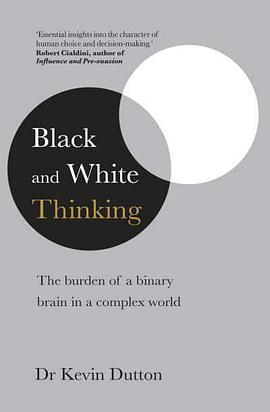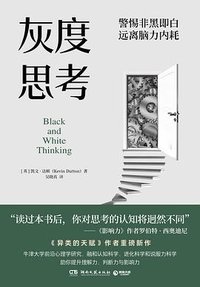Black and White Thinking
豆瓣
The Burden of a Binary Brain in a Complex World
Kevin Dutton
简介
Description
A groundbreaking and timely book about how evolutionary biology can explain our black-and-white brains, and a lesson in how we can escape the pitfalls of binary thinking.
Several million years ago, natural selection equipped us with binary, black-and-white brains. Though the world was arguably simpler back then, it was in many ways much more dangerous. Not coincidentally, the binary brain was highly adept at detecting risk: the ability to analyze threats and respond to changes in the sensory environment―a drop in temperature, the crack of a branch―was essential to our survival as a species.
Since then, the world has evolved―but we, for the most part, haven’t. Confronted with a panoply of shades of gray, our brains have a tendency to “force quit:” to sort the things we see, hear, and experience into manageable but simplistic categories. We stereotype, pigeon-hole, and, above all, draw lines where in reality there are none. In our modern, interconnected world, it might seem like we are ill-equipped to deal with the challenges we face―that living with a binary brain is like trying to navigate a teeming city center with a map that shows only highways.
In Black-and-White Thinking, the renowned psychologist Kevin Dutton pulls back the curtains of the mind to reveal a new way of thinking about a problem as old as humanity itself. While our instinct for categorization often leads us astray, encouraging polarization, rigid thinking, and sometimes outright denialism, it is an essential component of the mental machinery we use to make sense of the world. Simply put, unless we perceived our environment as a chessboard, our brains wouldn’t be able to play the game.
Using the latest advances in psychology, neuroscience, and evolutionary biology, Dutton shows how we can optimize our tendency to categorize and fine-tune our minds to avoid the pitfalls of too little, and too much, complexity. He reveals the enduring importance of three “super categories”―fight or flight, us versus them, and right or wrong―and argues that they remain essential to not only convincing others to change their minds but to changing the world for the better. Black-and-White Thinking is a scientifically informed wake-up call for an era of increasing extremism and a thought-provoking, uplifting guide to training our gray matter to see that gray really does matter.
————-
The ability to categorize served humanity well in the ancient past, where dichotomies like fight versus flight, us versus them, and right versus wrong all contributed to our collective survival. But as culture and language exploded massively in a relatively short period of time, our brains didn’t quite get with the times. As a result, today we’re stuck with brains that think in black and white in a world that is so often gray. Learning to spot these black-and-white framings can help us see and think more clearly.
Locate the Sorites paradox in a particular argument.
Hamza Choudhury is a Bangladeshi-British footballer who’s experienced his fair share of racial abuse. One day, it emerged that Choudhury himself had tweeted a crass racial joke when he was 15. He was fined several thousand pounds and ordered to attend an education course. But should Choudhury have been punished? What age is old enough to hold someone accountable? Five, seven, 12? When you’re trying to make a point, consider the Sorites paradox on the other side and your own. The cognitive workout will improve the clarity of your thought and your capacity for logical reasoning.
————-
Understand how and why our brains categorize the outside world.
A multitude of categories exists all around us – in movies, music, and even gender. Head to Netflix, for instance, and you can choose from 76,000 different movie sub-genres – everything from “Psycho-Biddy” to “Sea Creatures Playing Sports.”
You might think that having so many options is a good thing. But in fact, too many alternatives can quickly overwhelm your brain. Similarly, having too few choices is a path to stereotyping, hatred, and militancy.
The key to navigating the world is in finding a balance between the two – neither an excess nor dearth of categories. This book uncover the reasons why we categorize, how we do it, and when it leads us astray.
In this book, you’ll learn
• when a mountain becomes a molehill;
• why hoarders just can’t throw stuff out; and
• the power of the word “we.”
